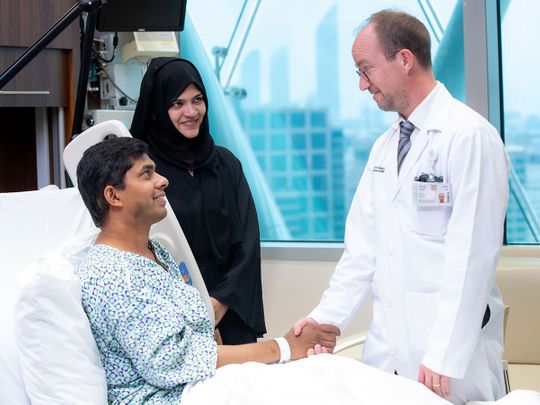
Abu Dhabi: A near-deaf Abu Dhabi patient has regained his hearing with an auditory brainstem implant after developing hearing loss because of intracranial tumours.
The implant on the 36-year-old patient, Shaikh Shamsuddin, was performed at the Cleveland Clinic Abu Dhabi. Shamsuddin had neurofibromatosis, a genetic condition that had over time led to the growth of several large benign brain tumours.
A surgery at another health facility had previously failed to remove all of Shamsuddin’s tumours, and more tumours had then developed, compressing large areas of his brain, and worsening his hearing.
By the time he was admitted to Cleveland Clinic Abu Dhabi, Shamsuddin was experiencing nearly complete hearing loss. “I couldn’t hear through both my ears, and we were praying to get a good doctor and a good hospital,” Shamsuddin said.
Dr Florian Roser, chair of the Neurological Institute at Cleveland Clinic Abu Dhabi, explained to Shamsuddin and his family that the tumours had permanently affected the functioning of the hearing nerve, which meant that external aids wouldn’t help restore hearing. Instead, the doctor suggested a procedure called an auditory brainstem implant (ABI) to prevent Shamsuddin from going completely deaf.
Best option
“Shamsuddin was a patient with a genetic disease leading to multiple large benign intracranial tumours. These were not only potentially life-threatening, but patients with these types of tumours often lose hearing as the tumours develop close to the hearing nerve. The plan was to first take care of the tumour resection as a life-saving procedure. At the same time, we needed to find a solution for his hearing loss. Implantation of an auditory brainstem implant was the best option for him, as it would help him regain some of his hearing capacity,” Dr Roser said.
While the implant would not grant a patient entirely new hearing, it could still help them detect sounds. The device is surgically implanted, and provides a sensation of sound to a person who has severe hearing loss due to damage to the auditory nerve. Although similar in function to a cochlear implant, auditory brainstem plants are designed for patients with a damaged auditory nerve, whereas cochlear implants are meant for those with cochlear damage. The auditory brainstem implant therefore bypasses the inner ear and the auditory nerve, and uses an array of electrodes to stimulate the hearing pathways on the brainstem directly.
“It’s not as though when we switch the device on, you have new hearing. However, many patients have reported improvements in their sound awareness and lipreading abilities after an implant,” Dr Roser said.
Cleveland Clinic Abu Dhabi’s multidisciplinary team of neurosurgeons and ENT surgeons is now capable of successfully executing this complex procedure close to home, the hospital said in a statement.
Delicate surgeries
The surgical team performed two delicate surgeries to resect the brain tumours first. These were considered high-risk procedures as crucial centers of the brainstem were involved. The first step involved removing the tumour on the side where the implant would be positioned. The second step was the preservation of the facial nerve to retain facial expression and movement, including the ability to smile and close the eyes, followed by the delicate and intricate placement of the implant. As a third step following the tumour surgery, the implant was positioned in a specific sub-millimeter area of the brainstem to receive auditory stimulation right on the brain. This cable was then connected to a computer device implanted behind the ear under the skin.
First sound
After the implant was activated and three months after the surgery, Shamsuddin was able to hear sounds that helped him function in his everyday life, including the fire alarm, the direction of approaching cars, and the phone ringing.
“I was very excited when the implant was activated for the first time. The beeping sound of the monitor was the first sound I heard after about a month and a half of complete hearing loss. After three months my hearing slowly improved, and I can now understand a little when someone is speaking. I cannot express my gratitude enough to Cleveland Clinic Abu Dhabi for how it has changed my life,” Shamsuddin said.











